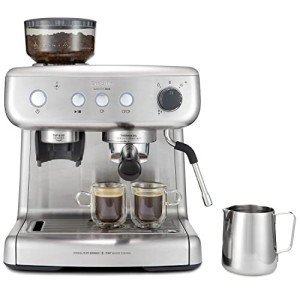15 Things You've Never Known About Home Espresso Machines
The Rise of Home Espresso Machines: A Comprehensive Guide
As coffee fans continue to seek fresh and delicious brews at home, the appeal of home espresso machines has actually surged recently. No longer simply the domain of coffee shops and coffee bar, these machines empower individuals to craft barista-quality espresso beverages from the comfort of their kitchens. Best Budget Espresso Machines will check out the numerous types of home espresso machines, their features, and considerations for selecting the right one. Additionally, it will provide a selection of FAQs to assist potential purchasers make notified decisions.
Kinds Of Home Espresso Machines
Home espresso machines can be categorized into numerous categories based on their mechanisms and user-friendliness. Each type has its distinct features, pros, and cons.
Type
Description
Pros
Cons
Manual Espresso Machines
Needs the user to manually control the developing procedure, involving techniques like pulling a lever to produce pressure.
- Complete control over developing procedure
- Compact style
- Requires skill and practice
- Time-consuming
Semi-Automatic Machines
Machine automates water flow and pressure, but the user still controls the dosing and duration of the brewing process.
- Balance of automation and control
- Versatile
- Learning curve for refining techniques
Fully Automatic Machines
Automates the whole brewing process, from grinding to brewing, frequently with programmable settings for customized beverages.
- Extremely user-friendly
- Quick and convenient
- Less control over the brewing process
- Higher price point
Pill or Pod Machines
Utilizes pre-packaged espresso capsules or pods to develop coffee quickly and quickly.
- Extremely easy to use
- Minimal cleanup
- Limited flavor variety
- More expensive per cup than ground coffee
Super-Automatic Machines
Combines functions of fully automatic machines with integrated mills, permitting users to brew whole bean espresso and milk-based drinks with one touch.
- All-in-one benefit
- Ideal for milk-based beverages
- Often the most pricey
- Can be large
Functions to Consider
When picking a home espresso machine, prospective buyers must consider the following functions to ensure they choose a machine that meets their needs:
Grinder Type:
- Built-in grinders can provide fresher grounds however might require more upkeep.
- Different mills permit more personalization of grind size.
Pressure:
- Look for machines that produce a minimum of 9 bars of pressure, which is optimal for brewing espresso.
Water Temperature Control:
- Machines with adjustable temperature settings permit better extraction of flavor from beans.
Milk Frothing Options:
- Consider whether you want a manual steam wand for frothing or an automatic milk frother for benefit.
Relieve of Cleaning:
- Machines with removable parts and self-cleaning functions significantly decrease clean-up time.
Size and Design:
- Ensure the machine fits easily in your kitchen area and aligns with your visual choices.
Budget:
- Set a budget before beginning your search, as costs can vary substantially from affordable models to high-end machines.
Benefits of Home Espresso Machines
Owning a home espresso machine uses many benefits:
- Cost-Effective: Over time, developing espresso in the house can save coffee lovers money compared to regular coffee shop gos to.
- Personalization: Users can explore various beans, grind sizes, and developing strategies to discover their perfect cup.
- Convenience: The ability to brew espresso any time removes the requirement to go out to a café, specifically advantageous during late nights or early mornings.
- Quality assurance: With a home machine, individuals have total control over the quality of active ingredients and developing procedures.
Downsides of Home Espresso Machines
Nevertheless, there are some drawbacks to think about:
- Initial Investment: High-quality espresso machines can be pricey, requiring a significant in advance financial investment.
- Knowing Curve: Mastering the art of espresso brewing can require time and practice, which might be daunting for novices.
- Upkeep: Like any home appliance, espresso machines require routine cleaning and maintenance to ensure optimal efficiency.
Frequently asked questions
1. What is the best kind of home espresso machine for beginners?
Answer: For novices, a semi-automatic machine is frequently recommended as it offers a balance between control and automation, allowing you to discover the essentials without overwhelming complexity.
2. How much should I invest in a home espresso machine?
Response: Entry-level machines can begin around ₤ 100 to ₤ 300, while higher-end models can range from ₤ 500 to over ₤ 2000. It's vital to set a budget based on your anticipated use and preferred functions.
3. Do I require a different grinder?
Response: While some espresso machines come with integrated mills, investing in a different grinder permits for higher personalization and guarantees better quality grounds.
4. How frequently should I clean my espresso machine?
Response: Cleaning frequency can differ by machine type, but it's generally suggested to clean the machine after each use and perform deep cleansings weekly or month-to-month, depending on use.
5. Can I make milk-based beverages with any espresso machine?
Answer: Not all machines include milk frothing capabilities. If you take pleasure in beverages like lattes or coffees, look for a machine with a steam wand or automatic frother.
Home espresso machines are transforming the method coffee aficionados enjoy their precious brews. With different types and advanced features readily available in the market, there is something for everyone. Whether it's the happiness of creating unique recipes or merely savoring the ideal shot of espresso, investing in a home espresso machine can enhance both the coffee-drinking experience and the lifestyle for coffee lovers everywhere. Similar to any investment, it is vital to weigh the benefits against the prospective drawbacks and choose a machine that seamlessly fits both your way of life and preferences.
